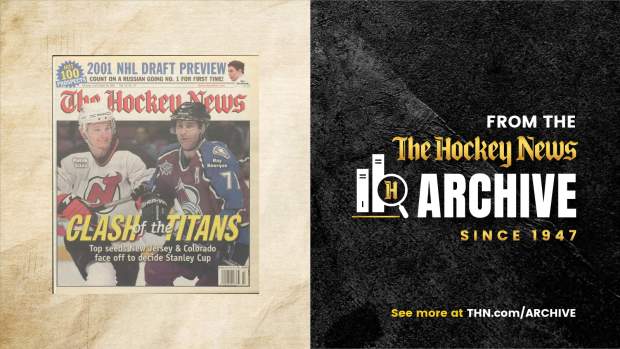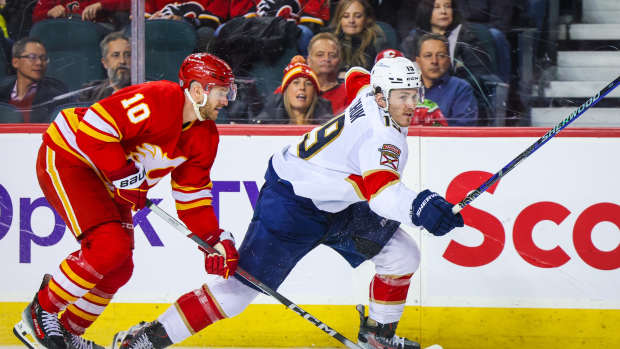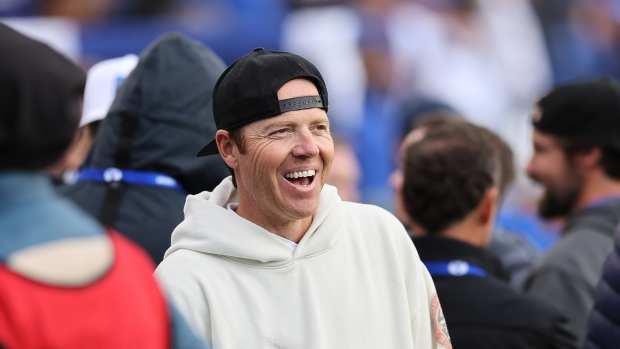Steve Yzerman's rise up the GM ranks was decades in the making
The NHL draft floor is to hockey reporters what a zoo exhibit is to excited tourists. A steel guardrail separates the scribes from 30 tables hosting the front office staffs of every franchise. There’s no guarantee a GM or scout will emerge from the mist and approach for an interview. We can only hope and call out names. It’s the hockey media’s equivalent of tapping the glass or throwing breadcrumbs.
The executives have no obligation to talk on the floor in the middle of the draft, so it’s a treat when they do. And it was quite the surprise June 24 in Buffalo when bespectacled Tampa Bay GM Steve Yzerman chose to hold court with a scrum of reporters. After all, Steven Stamkos was five days away from hitting the open market as the most significant unrestricted free agent in NHL history. The will-he-or-won’t-he speculation crackled and popped. Yet there Yzerman was, oddly relaxed, taking questions, even musing on the fact he’d probably have to trade one of his goalies, Ben Bishop or Andrei Vasilevskiy, before next year’s expansion draft.
It’s fair to wonder if Yzerman knew something the rest of the hockey world didn’t. Maybe Stamkos had all but committed to rejoining the Lightning, and the two parties merely had to iron out his eight-year, $68-million contract. We’ll never know. What we do know is Yzerman is used to winning. He won as a Hall of Fame player, captaining the Detroit Red Wings to three Stanley Cups. He won as an Olympian, even playing on one leg, helping Canada win gold in 2002. He won during his reign as national team GM, most notably at the 2010 and 2014 Olympics. And he’s on the cusp of winning as GM in Tampa Bay.
The more we learn about Yzerman’s path to the front office, the easier it is to see why his Lightning, not some deep-pocketed new suitor, won the Stamkos sweepstakes. It suddenly makes sense why Yzerman found a way to retain Jonathan Drouin rather than trade him. And it’s no surprise Yzerman locked up Victor Hedman to a long-term deal. The Lightning were supposed to be the team in greatest flux this summer. Instead, they return with their entire young core intact. It’s the same group that had the Pittsburgh Penguins on the brink of elimination in the Eastern Conference final despite not having Stamkos and Bishop for almost the entire series. That’s why we’ve picked the Lightning to take home the Stanley Cup in 2016-17. And while it appears Yzerman pulled a magic act to keep his team together, his legacy as a GM to date all comes down to preparation and the bulldog mentality he had as a player.
Talk to the minds who mentored him on his way here and we get the picture of a man obsessively studious, analytical, intense and borderline paranoid. Yzerman, 51, didn’t fall ass-backwards into success as a GM. He planned it with the meticulous attention to detail of a world-class detective.
In fact, Yzerman knew he wanted to run an NHL team while he still played for one. After Ken Holland took over as Detroit’s GM in 1997, Yzerman had a clause inserted into his next contract promising him a front-office role when he retired. He even began negotiating his own contracts during the end of his playing days. He still had an agent advising him, but Yzerman specifically requested to sit in with Holland. “He wanted to go through the negotiating process face-to-face with me,” Holland said, “to gather and get information and get experience for when he was done playing.”
Dallas GM Jim Nill, a teammate of Yzerman’s in the late 1980s, worked as Holland’s assistant GM in Detroit from 1997-98 to 2012-13 and picked up on Yzerman’s affinity for team management. On flights or after practices, Yzerman picked his brain and absorbed whatever he could. “He’d say, ‘What’s the reason behind doing this or that?’ or ‘Why would you send this kid down now?’ or ‘Why would you sign him now?’ ” Nill said. “So he was very astute, very observant of what was going on. You just knew he had that feeling.”
"He’s determined. He’s intense. It’s not like you go from a player into the front office and you lose all those traits."
Yzerman had just turned 41 when he retired July 3, 2006, and the Wings officially hired him to their front office less than three months later under the title of team vice-president and alternate governor. He began his obsessive apprenticeship. A favorite of Holland’s were the many car rides involving him, Yzerman, Nill and Ryan Martin, the Wings’ current assistant GM, who was director of player personnel at the time. The quartet debated every detail about the franchise, every scouting assignment, every prospect, every contract, and the arrangement was always democratic. Holland had the final word, but he wanted and respected his brain trust’s opinions. One of Yzerman’s strongest was that Pavel Datsyuk would be worth every penny if the Wings handed him a seven-year extension starting in 2007-08. He had intimate knowledge of Datsyuk’s character, having overlapped with him as a teammate, and Holland trusted Yzerman’s word. He said Yzerman was instrumental in getting that deal done. Datsyuk responded with back-to-back 97-point seasons and a Stanley Cup to commence that contract.
Holland and Nill describe Yzerman in those early days as the ultimate sponge, a relentless and devoted tagalong. “He sat in our amateur meetings, our pro scout meetings, and he sat in with me at the trade deadline,” Holland said. “He was at the office every day. Many times he’d go into Jimmy Nill’s office, (senior vice-president of hockey operations) Jimmy Devellano’s office, my office and pick our brains. ‘How do you pick a chief scout? Why do you pick a chief scout? What do the chief scouts do? What do the pro scouts do?’ In the early couple of years he just wanted to gather knowledge and information.”
Years of absorbing information and attending junior and minor league games everywhere within a 300-mile radius of Detroit helped Yzerman learn how to mine talent. It helped him envision exactly the type of team he wanted to build, and it made him a man of rock-solid conviction. Former longtime Hockey Canada CEO Bob Nicholson witnessed the 8transformation over Yzerman’s seven-year tenure as the national team GM, a.k.a. the planet’s most scrutinized roster builder. Nicholson and Wayne Gretzky, retiring from the gig as Canada czar, handpicked Yzerman as Gretzky’s successor after the 2006 Olympics. The Yzerman they got for the 2007 World Championship was an eager one, but he hadn’t yet found his confidence as a manager. He was so unsure about filling Gretzky’s gargantuan shoes that Nicholson had to broker an in-person meeting with the three of them, in which The Great One gave Yzerman his blessing.
In those early days managing Team Canada, right through to the gold medal Vancouver Olympic squad, Yzerman reportedly deferred a lot to his staff, which was smart considering it included minds like Holland, Kevin Lowe and Doug Armstrong. He had learned the democratic route from those car trips in Detroit and continued to play the role of relentless researcher. “Steve Yzerman is such a recognizable individual, yet he was just sneaking into buildings watching games,” Nicholson said with a laugh. “All of a sudden, ‘There’s Steve.’ ‘Here’s Steve.’ He was everywhere. He hit every rink in North America. That was his own preparation. And he utilized his people. He was always making sure he included everyone in decisions.”
The Yzerman helming the 2014 squad, in what turned out to be his final foray with Canada, was different. He was experienced. He knew exactly the team he wanted. He was the strongest voice in the room while assembling a Canadian squad that would allow just three goals in six games en route to gold at the Sochi Olympics. “The key difference in player selection in 2014 was that Steve and (coach) Mike Babcock really talked about how they would play before selections started,” Nicholson said. “So it was, ‘This is the style. Now let’s go find the players.’ ”
Four years earlier, around the time Sidney Crosby beat Ryan Miller between the legs in OT to clinch Canadian gold in Vancouver, Yzerman embarked on the fast track to becoming the fully matured GM he is now. In the months after the golden goal, Yzerman told Holland it was time to leave the Red Wings.
Yzerman’s resume since taking over the Lightning in 2010 suggests the years of study paid off. He’s built a track record of someone who rarely makes a bad decision – whether at the draft podium, on a trade or at the negotiating table. Look at the moves he’s made. On July 1, 2010, one of his first trades sent Andrej Meszaros to Philadelphia for a second-round pick in 2011. That pick turned out to be Nikita Kucherov, chosen 58th overall. Kucherov also signed a team-friendly extension recently. The Lightning also nabbed Vlad Namestnikov 27th, Nikita Nesterov 148th and, with the fourth-last pick, Ondrej Palat 208th. He’s outscored all but four players in the 2011 class.
In March of 2011, he signed undrafted center Tyler Johnson, who developed into a Calder Trophy finalist three years later. Around the same time, with his Lightning contending for the Stanley Cup, Yzerman nabbed Dwayne Roloson at the trade deadline. The cost? Ty Wishart, who has 26 NHL games to his name and now toils in Germany’s tier II league. Roloson posted a .924 save percentage in the playoffs, helping the Lightning get to Game 7 of the Eastern Conference final. Trading Kyle Quincey to Detroit in 2012 netted Tampa Bay a first-round pick that would become Vasilevskiy. And there was, of course, the Cory Conacher coup. Smack in the middle of Conacher’s breakout rookie season in 2012-13, Yzerman shocked pundits by sending him to Ottawa for Bishop, a 26-year-old prospect who hadn’t panned out yet. Yzerman got his franchise keeper, a Vezina finalist twice in the past three years.
Even the Martin St-Louis trade, the culmination of a rift that began when St-Louis was left off Canada’s initial Sochi Olympic roster, came up roses for Yzerman. He netted Ryan Callahan, a 2015 first-round pick and a 2014 conditional second-rounder that became another first-rounder when St-Louis’ new team, the New York Rangers, reached the Stanley Cup final. “Any time a player has his kind of success, he knows the team comes first,” Nill said. “I think that’s how he operates his business also. Nobody’s bigger than the team. And those situations he worked himself through, he made sure that was how he was going to implement whatever decisions he was going to make. He’s very confident, he’s been very successful, he knows what he’s going to do, and then he goes out and implements it.”
No GM is perfect, however. Yzerman whiffed on right winger Brett Connolly sixth overall in his first draft in 2010 (the next right winger to go was Vladimir Tarasenko at No. 16), and re-signing the injury-prone Callahan in 2014 for six years and $34.8 million looks like a mistake already. But it sure seems like Yzerman wins 90 percent of his transactions. “He’s strong-willed,” Holland said. “That’s one of the traits I thought made him a great player and a fierce competitor. He’s determined. He’s intense. It’s not like you go from a player into the front office and you lose all those traits.”
"He doesn’t talk in riddles. He doesn’t give you a couple of pieces to a 50-piece puzzle. He says, ‘Here’s what I want to do, and here’s why I want to do it."
St-Louis went up against him and lost. The Drouin camp went up against him, and now it appears Drouin will be a Bolt for years to come. A league source told THN Yzerman not only tried persistently to honor Drouin’s trade request but had actually been shopping him prior to it. Yzerman, however, wouldn’t force the wrong deal. “I had conversations with a GM regarding the Drouin situation who said, ‘If it were me, I would’ve traded Drouin within two weeks,’ ” said a source. “ ‘I don’t like debris. I don’t like messiness hanging around. Player doesn’t want to be here? Situation is a distraction for everybody. I don’t let those situations linger.’ There aren’t many GMs who would’ve hung in there as long as he did.”
In the end, Yzerman kept his most prized prospect, brought him back to the team, and Drouin went on to be one of Tampa’s best players in the playoffs. The two camps agreed after the season they all want to keep the partnership going, and Drouin is now off the market. “He’s one of my favorite people to deal with, because there’s never a hidden agenda,” said Drouin’s agent, Allan Walsh. “He doesn’t talk in riddles. He doesn’t give you a couple of pieces to a 50-piece puzzle. He says, ‘Here’s what I want to do, and here’s why I want to do it.’ You really know the entire situation, and that level of frankness and honesty breeds trust.”
“Nobody crosses Steve Yzerman” is a fun idea, but it’s not the full picture. Yzerman makes his moves based on painstaking preparation and research, with the help of his staff, including assistant GMs Julien BriseBois and Pat Verbeek, senior advisor Tom Kurvers and director of player development Stacy Roest. In that group, Yzerman has his democratic panel, his version of the Detroit car-ride crew.
Those who deal directly with Yzerman experience and appreciate his transparency, but his inner circle is hard to penetrate. They describe him as an intensely private man, devoted to his wife Lisa and their three daughters. Nicholson calls him “someone you want to have a beer and a laugh with” but also “protective in all parts of his life.” Yzerman goes out of his way to stay out of the limelight. That’s why he and the Lightning declined to participate in this story.
Maybe that befits the modern Yzerman character sketch. He puts the team first and wants no part of any potential distraction. He prefers to focus on the one major honor that has eluded him as an executive. He won the 2014-15 GM of the year award but hasn’t captured a Stanley Cup. With his key pieces retained and a dominant team comprised almost exclusively of players still in their 20s, he’s in a plum position to get his wish.
This is an edited version of a feature that appeared in the Season Preview issue of The Hockey News magazine. Get in-depth features like this one, and much more, by subscribing now.




